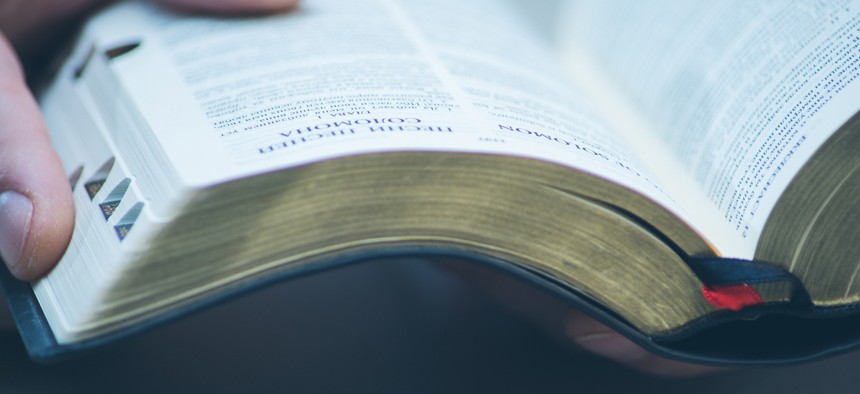School Board's Prayer Policy Ruled Unconstitutional

The ruling, if upheld, could have broader implications for other legislative bodies that pray before meetings. Shutterstock

Connecting state and local government leaders
A federal appeals court ruled that the Chino Valley Unified School District's prayer policy violated the First Amendment.
A California school board will ask the U.S. Supreme Court to review a recent federal appeals court ruling that prohibits prayer at the beginning of its public meetings.
The Ninth Circuit U.S. Court of Appeals in July reaffirmed a district court ruling that meetings of the Chino Valley Unified School District board could not involve prayers, scripture readings or proselytizing of any kind.
“The prayers frequently advanced religion in general and Christianity in particular,” a three-judge panel decreed in an unsigned decision. “The prayer policy’s purpose is predominantly religious in violation of the Establishment Clause,” part of the First Amendment that prohibits government actions that favor one religion over another, or favor religion over non-religion.
The school board had argued that it was protected by previous court decisions that have allowed prayer at the beginning of meetings of Congress, state legislatures and town boards. But the court said the school board’s meetings are different from those of traditional legislative bodies because they’re frequently attended by children who are required to be present for class credit, to give presentations or receive commendations.
“This is not the sort of solemnizing and unifying prayer, directed at lawmakers themselves and conducted before an audience of mature adults free from coercive pressures to participate, that the legislative-prayer tradition contemplates,” the decision says. “Instead, these prayers typically take place before groups of schoolchildren whose attendance is not truly voluntary and whose relationship to school district officials, including the board, is not one of full parity.”
The court also rejected the school board’s argument that its prayer policy was rooted partially in a desire to “demonstrate respect for religious diversity,” noting that the policy only allowed the board to invite “religious leaders with established religious communities within the district’s boundaries” to give invocations at meetings.
That clause excluded multiple religions practiced by people within the district—among them Buddhism, Judaism and Mormonism—whose faiths lack “a sufficient critical mass to sustain an established community within the district’s borders.”
“Far from highlighting the full range of religious diversity and beliefs,” the ruling says, “the invocation policy reinforces the dominance of particular religious traditions,” namely Christianity.
The Chino Valley school board voted 3-2 at its Aug. 1 meeting to petition the Supreme Court to review the case.
“The U.S. Ninth Circuit of Appeals, based in San Francisco, does not reflect the multitudes of Californian family values and laws,” board member Andrew Cruz told Champion Newspapers. “The Supreme Court, which begins its sessions with a prayer, ‘God save the United States and this honorable court,’ understands that prayer is a part of our country’s history and government establishments.”
It’s possible that the ruling, if upheld, could have broader implications for legislative bodies other than school boards, said David Pierucci, an attorney with Best Best & Krieger, a law firm with offices in California and Washington D.C.
“The Ninth Circuit’s holding that the school board’s invocation invitations and recruitment were under-inclusive and board members’ statements were effectively proselytizing could also apply to a city council, planning commission or other body,” he said.
Children’s attendance is also a factor at meetings of some of those groups, Pierucci noted.
“City council meetings will sometimes feature presentations by individual students or classes, whose attendance at the meeting may also be involuntary in nature,” he said.
The lawsuit began in 2014 when the Wisconsin-based Freedom From Religion Foundation sued the school district, contending that its meetings “resemble a church service more than a school board meeting.”
School board meetings open with prayer and often include Bible readings, and the board’s then-president James Na “injects Christianity into many of his official statements,” the complaint said. At one typical meeting, Na said “‘our lives begin in the hospital and end in the church,’ and urged everyone who does not know Jesus Christ to go and find Him.” After that, another board member “closed by reading Psalm 143.”
The complaint noted that courts—including two federal appellate courts, the Third and Sixth Circuits—have previously held that organized prayer in public schools is unconstitutional.
Best Best & Krieger advised that other public agencies whose meetings include invocations ensure that their policies are consistent with case law. Specific recommendations include crafting a policy that includes “outreach to smaller, less established religious communities and individuals” and that boards “consider the sequence of your agenda, especially if the invocation precedes matters involving children.”
Educational institutions, the firm added, should “accept that courts generally require a great distance between prayers and schools.”
Kate Elizabeth Queram is a Staff Correspondent for Government Executive’s Route Fifty and is based in Washington, D.C.

NEXT STORY: Caught in a Disaster? Your Rescuer Might Be an Amateur




